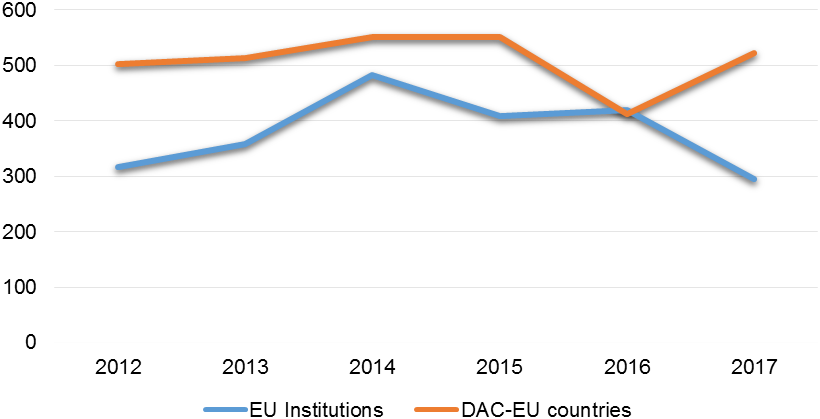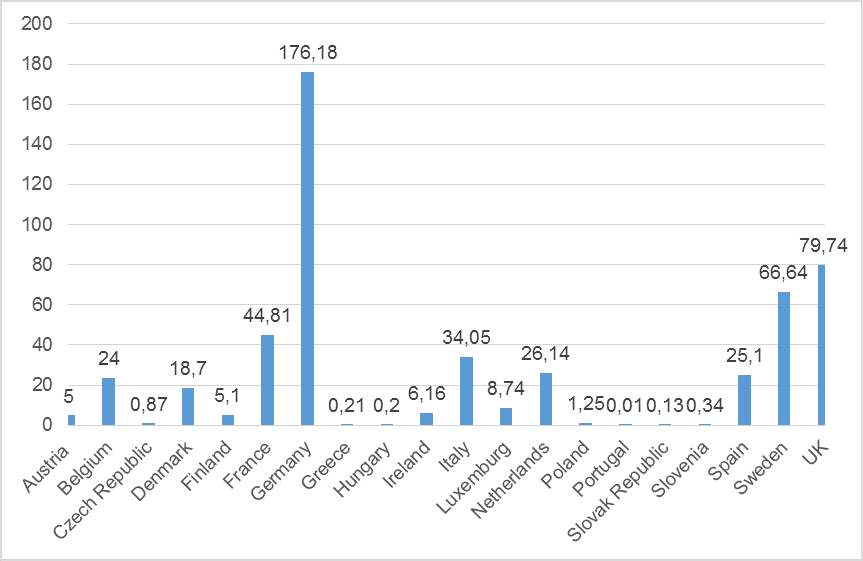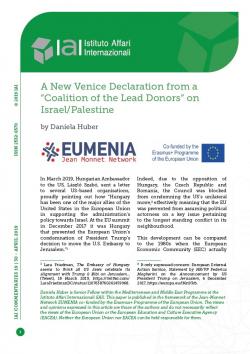A New Venice Declaration from a "Coalition of the Lead Donors" on Israel/Palestine
In March 2019, Hungarian Ambassador to the US, László Szabó, sent a letter to several US-based organisations, proudly pointing out how “Hungary has been one of the major allies of the United States in the European Union in supporting the administration’s policy towards Israel. At the EU summit in December 2017 it was Hungary that prevented the European Union’s condemnation of President Trump’s decision to move the U.S. Embassy to Jerusalem.”[1]
Indeed, due to the opposition of Hungary, the Czech Republic and Romania, the Council was blocked from condemning the US’s unilateral move,[2] effectively meaning that the EU was prevented from assuming political actorness on a key issue pertaining to the longest standing conflict in its neighbourhood.
This development can be compared to the 1980s when the European Economic Community (EEC) actually displayed such political actorness. In 1979, the Egyptian-Israeli Peace Treaty, signed under US auspices, had not seriously attempted to solve the Palestine question. Concerned about this, the Foreign Ministers of the nine EEC member states came out with the path-breaking Venice Declaration.
In it, the nine states officially recognised the right of the Palestinian people to self-determination, demanded the inclusion of the Palestinian Liberation Organisation (PLO) in negotiations, stressed “the need for Israel to put an end to the territorial occupation which it has maintained since the conflict of 1967”, and pointed out that “Israeli settlements constitute a serious obstacle to the peace process in the Middle East”. On the issue of settlements, the Nine stressed their consideration “that these settlements, as well as modifications in population and property in the occupied Arab territories, are illegal under international law”.[3]
The Venice declaration was perceived as a bombshell by the Israeli right-wing government led by Prime Minister Menachem Begin at the time. It also set the stage for the EEC’s contestation of Reagan administration policies on two key dossiers: the illegality of Israeli settlements, and the inclusion of the PLO in peace talks.
The EEC showed remarkable commitment to the principles it had endorsed in the Venice Declaration, which it continued to insist on in a stream of statements in the following years. Towards the end of the 1980s, the Reagan administration eventually began to change its position towards the PLO, thus opening the road to peace negotiations.
Today, the EU faces a US administration that is tearing down the last parameters of standing US policy on Israel/Palestine. In particular, Trump is taking aim at the “final status issues”: Jerusalem, the Palestine refugees, or – when it comes to Syria – the Israeli-occupied Syrian Golan Heights.
This US policy has dangerous consequences. It risks exacerbating a conflict in Europe’s direct neighbourhood and undermines established international norms and international law. As in the 1980s, Europe continues to have a clear interest to act to protect its own interests and international law. However, unlike the 1980s, the EU has become absorbed in the US-led Middle East Peace Process in the framework of which it became a key “payer”, giving up its own-standing role as a “player” in the process.
In addition, the EU has gone through its Eastern Enlargement in the 2000s and now consists of 28 member states. Finding consensus in the Council has become more difficult as a result, particularly on such an emotionally charged issue as the Israeli-Palestinian conflict. Both developments make it challenging for the EU to re-assume its player role of the 1980s.
In light of this, leading European donors should form a coalition that is willing and able to assume such a political role. These states have a clear interest to make sure they do not endlessly disburse money without having political influence. Since the Oslo Accords of the 1990s, they have spent billions on building a Palestinian state that was never allowed to come into being.[4] They have assumed the financial burden of the occupying power, further dis-incentivising it to end its perpetual occupation.
Figures 1 and 2 show how much EU institutions and the DAC-EU countries[5] have disbursed to the West Bank and Gaza since 2012, as well as which European countries have been key donors in 2017 in millions of US dollars.
Figure 1 | Total aid to West Bank and Gaza in million US dollars, 2012-2017

Source: OECD, QWIDS - Query Wizard for International Development Statistics, https://stats.oecd.org/qwids.
Figure 2 | Aid by EU member states to West Bank and Gaza in million US dollars, 2017

Source: OECD, QWIDS - Query Wizard for International Development Statistics, https://stats.oecd.org/qwids.
The nine key donors are Germany, the UK, Sweden, France, Italy, the Netherlands, Spain, Belgium and Denmark. Four of these states (the UK, France, Germany and Belgium, plus Poland) are currently also in the United Nations Security Council. They should form a lead group and present a new paradigmatic Venice Declaration focused on two issues: protecting final status issues/international law and ending the no-contact policy with Hamas.
Regarding the first, while rumours on a “deal of the century” continue to circulate, the current US administration is already implementing a forcible policy on the conflict. It moved the US embassy to Jerusalem in contravention to international law and consensus. It has threatened the International Criminal Court (ICC), where a preliminary examination of the Palestine case is pending.[6] It pulled out of the United Nations Relief and Works Agency (UNRWA), which “from its inception embodied the international community’s responsibility and commitment to implement the right of return”[7] and provides life-saving services for millions of Palestinian refugees. For those living in the besieged Gaza Strip, the prospect of an end to UNRWA services is often “a matter of life and death”.[8]
The US has also given green light to the Israeli government to continue its ongoing de-facto annexation of Area C of the occupied West Bank (where the EU cannot even protect EU-funded structures from being demolished by Israeli authorities).
Indeed, shortly after the US recognised the illegal Israeli annexation of the Syrian Golan Heights, Israeli Prime Minister announced his intention to formalise the annexation of the settlements in the occupied Palestinian territories in violation of international law.[9] As EuroMed Rights has pointed out, annexation “has long existed de facto in the Occupied Palestinian Territory, alongside the systematic discrimination and dispossession of Palestinian rights. Netanyahu’s campaign simply promises to formalise this well-established situation – from occupation to annexation; from unequal rights to apartheid”.[10]
These recent developments make it imperative that the EU acts in the form of a lead group. It is now of the utmost importance that the Nine lead donors come out with a declaration which protects the so-called final status issues, legal international norms that pertain to them, as well as the institutions of international law, namely the ICC and the International Court of Justice (ICJ) and the pending examinations there.
The lead group must define basic parameters on the end of the occupation and Israeli withdrawal from all the territories occupied in 1967 in line with peremptory norms of international law (the right to self-determination and the prohibition against the acquisition of territory by war). Crucially, this must be accompanied by a timeline, after which the Nine will consider that in light of Israel’s perpetual occupation and the creeping de-facto annexation of Palestinian land without the prospect of Palestinian citizenship, it is time for Europeans to follow the example of South Africa in downgrading diplomatic relations and evoking the apartheid convention.[11]
Regarding the Gaza Strip – an integral part of the Occupied Palestinian Territories – the UN has repeatedly pointed out how it is facing “an unprecedented humanitarian crisis […] driven by over 11 years of an Israeli blockade and an unsolved internal Palestinian divide”.[12] The UN has also estimated that by the year 2020 the Gaza Strip will be uninhabitable.[13]
The year-long “Great March of Return” in Gaza is indeed a reaction to this unbearable situation and a desperate appeal to the international community “to take action to end their suffering”.[14] However, despite Israel’s killing of more than 260 unarmed Palestinian protesters and the injuring of nearly 6,400 more with live ammunition, the EU has hardly reacted.
Indeed, Europeans had once again blocked their own political actorness on Gaza by following the US in their no-contact policy with Hamas, which the EU sustains even as Israel itself has negotiated repeated ceasefires, prisoner swap deals and the prospect of a longer-term agreement directly with Hamas. This EU policy has been a major hurdle for the prospect of power sharing between the rival Palestinian factions Fatah and Hamas since the former, as the chosen partner of the international community, has no incentive to share power.[15]
The Nine should switch course and end their no-contact policy, calling instead upon all actors in the conflict (including Hamas) to unequivocally respect international humanitarian and human rights law.
Such a Declaration would clearly raise the European lead donor group’s profile as an actor in the conflict and force other regional and global actors to react. It would help the lead group take the initiative, ending a tendency to simply sit back and wait to react to what US President Donald Trump or Israeli Prime Minister Benjamin Netanyahu are doing, but rather act proactively in defence of international law while working to address the ongoing humanitarian catastrophe in Gaza. Currently, the EU is not moving forward; it is sliding back.
* Daniela Huber is Senior Fellow within the Mediterranean and Middle East Programme at the Istituto Affari Internazionali (IAI).
This paper is published in the framework of the Jean-Monnet Network EUMENIA co-funded by the Erasmus+ Programme of the European Union. The views and opinions expressed in this article are those of the authors and do not necessarily reflect the views of the European Union or the European Education and Culture Executive Agency (EACEA). Neither the European Union nor EACEA can be held responsible for them.
[1] Lara Friedman, The Embassy of Hungary seems to think all US Jews celebrate its alignment with Trump & Bibi on Jerusalem... [Tweet], 18 March 2019, https://twitter.com/LaraFriedmanDC/status/1107638760261459968.
[2] It only expressed concern: European External Action Service, Statement by HR/VP Federica Mogherini on the Announcement by US President Trump on Jerusalem, 6 December 2017, https://europa.eu/!Mn93rb.
[3] European Council, Venice Declaration, 13 June 1980, https://eeas.europa.eu/mepp/docs/venice_declaration_1980_en.pdf.
[4] Dimitris Bouris, The European Union and Occupied Palestinian Territories. State-Building Without a State, London/New York, Routledge, 2014.
[5] EU member states present in the OECD’s Development Assistance Committee.
[6] Owen Bowcott, Oliver Holmes and Erin Durkin, “John Bolton Threatens War Crimes Court with Sanctions in Virulent Attack”, in The Guardian, 10 September 2018, https://gu.com/p/9bhb4.
[7] Karim Makdisi, “Palestine and the Arab–Israeli Conflict: 100 Years of Regional Relevance and International Failure”, in MENARA Working Papers, No. 27 (December 2018), p. 16, http://www.menaraproject.eu/?p=1383.
[8] Tareq Baconi, “One Year of Gaza Protests. A New Era of Palestinian Struggle?”, in The New York Review of Books Daily, 29 March 2019, https://www.nybooks.com/?p=65878.
[9] Victor Kattan, “The False Premise Sustaining Israel’s West Bank Claim – Part I”, in Opinio Juris, 8 April 2019, https://opiniojuris.org/?p=35031.
[10] EuroMed Rights, Israel/Palestine: Towards Netanyahu’s Fifth Government, from Occupation to Annexation, 10 April 2019, https://euromedrights.org/publication/israel-palestine-towards-netanyahus-fifth-government-from-occupation-to-annexation.
[11] Middle East Monitor, South Africa Embassy to Israel Begins Downgrading Relations, 5 April 2019, https://www.middleeastmonitor.com/20190405-south-africa-embassy-to-israel-begins-downgrading-relations.
[12] United Nations Office for the Coordination of Humanitarian Affairs (UNOCHA) OPT, Gaza Strip: Early Warning Indicators – July 2018, 15 August 2018, https://www.ochaopt.org/node/9864.
[13] United Nations Conference on Trade and Development (UNCTAD), Report on UNCTAD Assistance to the Palestinian People: Developments in the Economy of the Occupied Palestinian Territory (TD/B/62/3), 6 July 2015, https://undocs.org/TD/B/62/3; United Nations Country Team in the oPt, Gaza in 2020. A Liveable Place?, August 2012, https://www.unrwa.org/node/7856.
[14] Tareq Baconi, “One Year of Gaza Protests”, cit.
[15] In 2017, Hamas had come out with a new positional document clearly aimed at the international community, in which it moved closer to accepting a specific version of a two-state solution. The document went so far to accept the PLO as a “national framework” which should, however, rebuild its democratic foundations. See Hamas, A Document of General Principles and Policies, 1 May 2017, http://hamas.ps/en/post/678.
-
Dati bibliografici
Roma, IAI, aprile 2019, 6 p. -
In:
-
Numero
19|30
Tema
Tag
Contenuti collegati
-
Ricerca09/10/2019
EU-Middle East Network in Action – EUMENIA
leggi tutto




